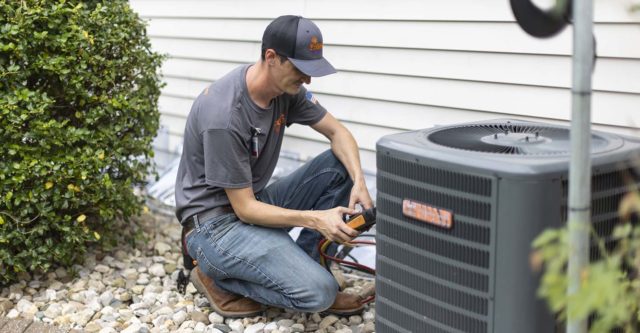Homeowners would be happy if their HVAC equipment lasted forever, but obviously, that’s not realistic. At some point, they will have to replace their furnaces, air conditioners, and/or heat pumps, which often prompts the question of how long do these units typically last.
A recent survey conducted among homeowners and HVAC contractors sought to answer that question, and results showed that a majority of homeowners expect their HVAC equipment to last anywhere between 11 to 20 years. This expectation aligns rather closely with the actual replacement timeline that contractors often encounter in the field.
The survey in question was conducted in March 2023 by Clear Seas Research, the research unit of BNP Media, parent company of The ACHR NEWS. It’s comprised of 400 homeowner responses and 104 contractor responses. When homeowners were asked how long their HVAC equipment should last, 8% chose 5-10 years; 29% chose 11-15 years; 39% chose 16-20 years; 15% chose 21-25 years; and 8% chose 26 years or more.
Homeowners expect HVAC equipment to last...
Sample size: 2023 = 400
On the contractor side, 15% expected equipment to last 5-10 years; 47% said 11-15 years; 29% said 16-20 years; and 7% said 21-25 years. While geographical location can impact the lifespan of a system, most contractors agree that proper installation and regular maintenance are the keys to making sure HVAC equipment lasts as long as possible.
Contractors find HVAC equipment to last...
Sample size: 2023 = 104
How long do homeowners expect HVAC equipment to last? ACCA CEO Bart James shares his thoughts on HVAC residential equipment life expectancy.
General manager and co-owner
Tiger Plumbing, Heating, Air Conditioning Services and Electrical
Maintainance is Critical
When asked how long HVAC equipment usually lasts in his region, Todd Kiefer, general manager and co-owner of Tiger Plumbing, Heating, Air Conditioning Services and Electrical in Collinsville, Illinois, said that some well-maintained equipment can last up to 30 years.
“A well-maintained gas furnace can last anywhere from 15 to 30 years,” he said. “Electric furnaces typically have a slightly shorter lifespan, ranging from anywhere from 10 to 20 years, while air conditioners typically last 15 to 20 years with proper maintenance.”
Maintenance is critical for equipment longevity, which Kiefer likens to the regular service needed for cars. “If you don't take care of your car, do the oil changes and such, it's going to kill the lifespan of that car,” he said. “The same goes with a furnace and air conditioner. If homeowners are not regularly changing the filters, having it tuned up by a professional heating and cooling company, etc., it's going to greatly decrease the lifespan of those units.”
William Brittingham, president of Jerry Brittingham A/C & Heat Inc., in South Daytona, Florida, agrees, noting that maintenance is particularly critical in his area, given their proximity to the ocean.
“Dirt, such as dust, salt, sand, hair, lint, etc., is a main factor in the reduced lifespan of a properly installed HVAC system,” he said. “Regularly rinsing the condenser coils with fresh water can help remove the salt and dirt that speeds up corrosion. Also, using quality filters and replacing them regularly helps keep the air handler and its components clean. Doing these things between regularly scheduled system checkups can help homeowners get the most out of their systems.”
Based on Brittingham's experience on Florida's east coast, residential HVAC equipment generally lasts around 10 to 15 years. Beyond this timeframe, systems typically deteriorate to the point that they are no longer efficient due to the salty environment, he said. That environment can be even harder on properties located on or close to the beach, which may see their condenser lifespans be as short as seven years.
HVAC systems in Rusty Cochran’s part of the country can last 12 to 25 years, provided they are properly installed and maintained. The president of We Care Plumbing, Heating, and Air in Murrieta, California, said that regular maintenance keeps the system clean, allowing the airflow to easily move across the coil and throughout the ductwork. He noted that his company sees fewer breakdowns when a system is properly maintained.
But just because a system can last several decades, doesn’t always mean it should. As Cochran noted, “Keeping a system over 20 years could be expensive, with repairs and energy bills, along with poorer comfort. Also, today’s technology with variable-speed indoor and outdoor units makes the comfort so much better than older systems.”

IMPROVED COMFORT: Newer units that have variable-speed indoor and/or outdoor units can improve homeowner comfort. (Courtesy of We Care Plumbing, Heating, and Air)
Managing Expectations
When systems hit the 10-year mark, Cochran will usually start talking to homeowners about replacement options. At that point, the warranty is usually coming to an end, and the efficiency and comfort of the system may be lacking. He also likes using the car analogy when explaining to customers that it may be time to replace a system.
“The older the car (HVAC system), the less efficient it will be,” he said. “Would you keep a car with 300,000 miles on it that’s 12 years old?”
If homeowners are concerned about cost, Cochran lets them know that HVAC systems are not going to be cheaper in the future. “With inflation on the rise, systems will continue to be more expensive,” he said. “I use the phrase, ‘There’s never been a better time than now to replace your system.’ If money is a concern, offering financing can help offset the purchase.”
The 10-year mark is also when Brittingham starts having the replacement conversation with homeowners, particularly if the equipment has already failed. Past that point, major repairs could be expensive, so he takes the time to communicate the cost of the repair versus the cost of a new system.
“This gives them what they need to make an informed decision,” he said. “When the 10-year parts warranty expires, major repairs like coil or compressor replacements or refrigerant leaks could be very costly. That’s when we have the repair versus replace conversation.”
Regardless of the age of the system, Kiefer says his technicians have been trained to look for signs that it may be time to replace the equipment, rather than repair it. Although the conversation can be difficult to have, particularly if the equipment fails before the end of its expected lifetime.
“Sometimes a new homeowner moves in and realizes that their furnace hasn't been maintained from the previous homeowners,” said Kiefer. “It could only be five to seven years old, but they’ve had multiple breakdowns. At that point, it might make more sense to go ahead and replace that furnace or air conditioner.”
That can sometimes result in sticker shock for the customer, but again, Kiefer stresses that it all comes down to educating the homeowners, as well as the technicians.
“The cost of everything has gone up, and most customers understand that,” he said. “Material costs have gone up, so has the cost of labor, insurance, vehicles, gas, as well as the tools needed to install the furnaces and air conditioners. Just look at how much a car was 10 years ago compared to where it is now. We just use those analogies and again, educate our technicians, installers, and sales staff to be able to handle those objections in a way that makes the customer feel comfortable.”
The good news for homeowners who choose to replace their older units is that modern systems typically incorporate advanced technology, which can potentially prolong the lifespan of their new HVAC system.
“There is a lot of technology on these units that helps contractors optimize these systems,” said Cochran. “Thermostats can communicate with our software or the manufacturer’s software right from our office, so we can send maintenance reminders to homeowners. When an error code comes up, we are usually able to see what the issue is. This means we can contact the homeowner prior to them even knowing there is an issue, and we can send out the right technician with the right part. This is a huge time saver for the company, and the homeowner is happy to have their system up and running quickly.”











Report Abusive Comment